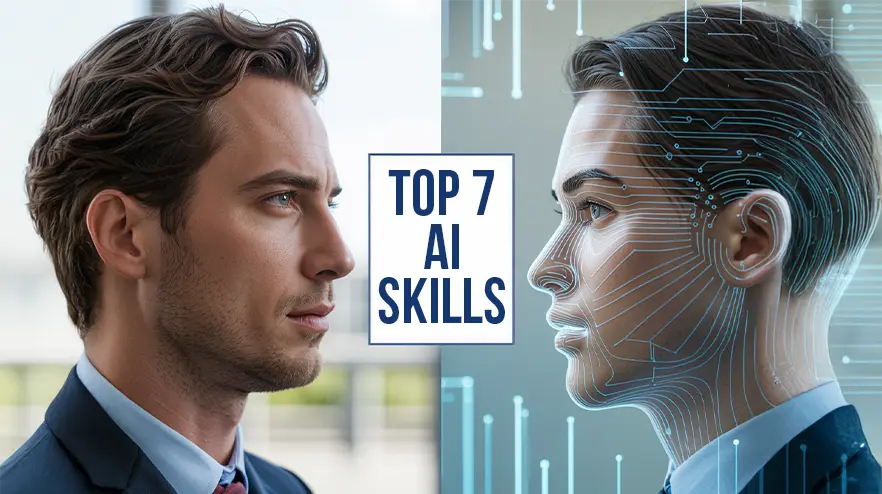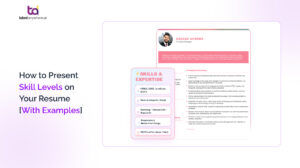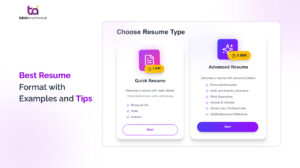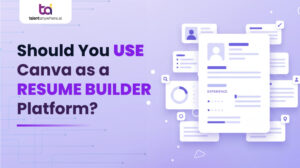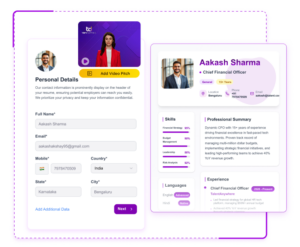The world Economic Forum has recently predicted that 92 million jobs will become obsolete, while 170 million new jobs will emerge by 2030 due to AI adoption. You might be nailing your career now, but once AI takes over routine business processes and automates the predictable, learning skills that machines can’t replicate will set you apart and make you indispensable in the job market.
As AI redefines job roles and work, the question is not whether it will impact careers, but how you will adapt to this evolving landscape. We studied 30+ expert reports and analyzed real hiring trends to bring you the top AI skills to get hired, the 7 most in-demand AI job skills that can make you instantly hireable in the age of AI.
Why Your Current Skills May Not Be Enough Anymore

Though AI technology was discovered a long time ago, ChatGPT further democratized it—and now this tech is reshaping how we work. However, 68% of organizations feel that there is a wide skill gap in the workforce; it means people are not ready yet to use AI at work.
For years, we have been chasing degrees and experiences only to find out that one day AI will automate much of that work. The good news is there are some roles and qualities that are unique to humans and AI doesn’t possess them yet. To fulfil and justify the future roles of AI, it is crucial to upskill and reskill by focusing on AI job skills that make you hireable and investing in the best AI skills for career success. Understanding how to learn AI skills to get hired is equally important, ensuring you stay competitive and relevant in today’s changing job markets and beyond.

Let AI assess your skills and recommend personalized learning paths based on your resume and desired role — so you’re always job-ready.
Master These 7 AI Skills to Stay Relevant, Hireable, and Ahead of AI
If you want to stay relevant, stand out, and thrive in this new era, mastering the in-demand AI skills that are shaping the future is essential. This list of AI skills employers want isn’t just a trend, it’s a roadmap to staying competitive and hireable.
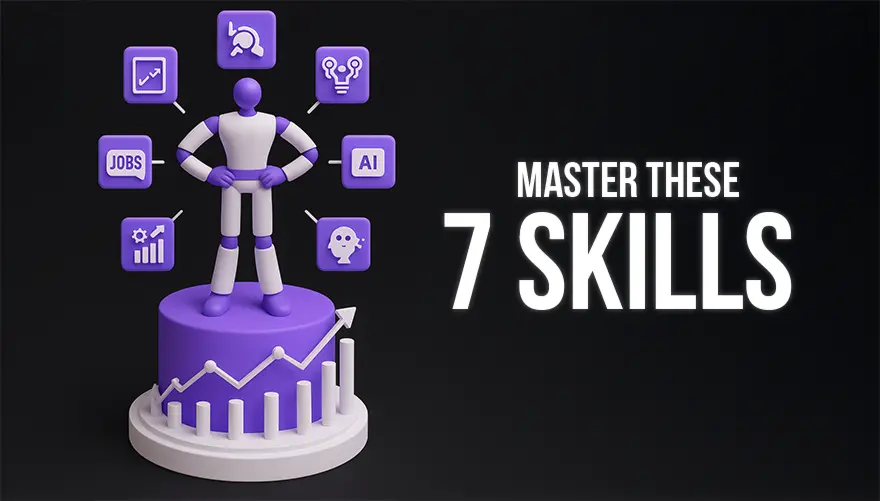
1. Adaptability—Be resilient and open to change
Adaptability is the first step to embracing AI. As companies worldwide embed AI into their workflows, the pace of change is accelerating like never before. Processes are being automated, new tools are replacing old ones, and job roles are evolving in real time. To stay relevant, you should do more than just keep up; you should evolve through it.
LinkedIn’s 2024 Most In-Demand Skills report ranks adaptability as the topmost skill for succeeding in an AI-powered world. This is because when your team shifts to AI-driven tools, or your daily tasks are restructured overnight, employers will choose individuals who can pivot quickly — not panic. Adaptability means you’re not just surviving these changes — you’re learning, growing, and thriving through them. It’s what makes you a frictionless, future-ready employee in workplaces that are in constant motion.
How to build this skill:
You build adaptability by stepping out of your comfort zone — regularly. Try new tools before you’re asked to. Say yes to projects that challenge your usual way of working. And when things change (as they will), pause, learn, and move forward with curiosity instead of resistance. That’s how you stay sharp in an AI-shifting world.
2. Creativity & Innovation—Think out of the box
When work gets automated, it’s your creativity and innovation that will set you apart and move you forward. AI can analyze data and generate content, but the ability to create original ideas, build new strategies, and solve problems in unstructured situations still rests with humans. Intuition, emotional intelligence, the spark of a new concept, and knowing the difference between what can be done versus what should be done—these are powerful human traits that AI simply can’t replicate (yet), and they’ll be your superpowers in an AI-driven world.
Forbes Technology Council member, Juta Gurinaviciute, stated that Companies will increasingly value people who can think differently and create original ideas that enhance what AI can do. Since creativity is still a distinctly human strength, it stands out as one of the most valuable skills in the age of AI.
How to build this skill:
Block your 20 minutes a week for a “What if” session. This is your ‘out-of-the-box’ thinking time on your tasks: What if your onboarding process felt like a game? What if your campaign had no text, only visuals? Then, pick one idea and try prototyping it with AI. This blend of raw imagination + AI execution trains your brain to think beyond norms and use AI as a creativity amplifier, not a crutch.
3. AI Literacy—Learn how to work with AI
If you’re just a marketer, you might blend in. But if you’re an AI-powered marketer, you’re instantly more valuable, future-ready and in demand. And that holds true across roles.
According to Mint, AI-related job postings have surged by 80%, and candidates with AI skills on their résumés are seeing up to 64% higher salaries — even in non-tech roles. Sometimes, companies hire such talent not out of necessity, but to simply showcase that they are “AI-ready.”
No matter your field, learning how to use AI tools relevant to your role is no longer a bonus — it’s a necessity to rise above others in a competitive landscape. As more routine work gets automated, the demand for AI-savvy professionals will only grow — because AI won’t take your job, but someone who knows how to use it might.
How to build this skill:
Choose one AI tool—specifically related to your job—such as ChatGPT for copywriting or Midjourney for design and make a commitment to integrating it into your daily tasks for the next ten days. Don’t only use it for output; understand how prompts work, test its boundaries, and record what boosts productivity or creativity. This practical method develops not only familiarity but also demonstrable real AI fluency.
4. Data responsibility and intent—Learn to handle data smartly
In the AI age, data is not something that only analysts will deal with anymore. AI generates data as output, and whosoever uses AI for any task should have the ability to monitor, evaluate and guide AI systems to ensure responsible and ethical data usage.
Since ChatGPT has become hype, almost every AI model has recorded incidents of biased and hallucinated responses, which can attract legal troubles for businesses. That’s why companies are now actively looking for professionals who can spot flawed data, challenge unfair algorithms, and make sure data-driven outcomes are both accurate and responsible.
Even as a non-tech employee — whether you’re in HR, sales, marketing, customer support, or content — you’ll use dashboards, AI tools, analytics reports, or customer data. And in that moment, you’ll need to ask: Is this data telling the full story? Could this outcome be biased? What impact could this decision have?
How to build this skill:
Develop your ability to understand, question, and ethically use data regardless of your job title. Start by learning basic data literacy — understand what metrics mean, how they’re collected, and what limitations they may have
5. Critical Thinking & Decision-Making—Be curious, logical, & goal-oriented
In the future, when working collaboratively with AI becomes the norm, critical thinking will be the key differentiator that sets you apart from the competition. While AI delivers instant answers, the latest research says that it also increases our tendency to fall into cognitive bias—where our brains start preferring shortcuts over questioning results or viewing them through our own lens.
A McKinsey study revealed that only 20% of AI users verify data before using it. Unchecked AI outputs can lead to serious issues in quality, context, or compliance. The solution? Critical thinking and mindful analysis.
As AI adoption becomes widespread, businesses will actively seek professionals who can interpret, question, and assess—not just accept what AI says. That’s what will separate you from everyday AI users. As ABB’s Global Head of People, Guillaume Delacour, puts it: “In our AI-enabled workplace, where every question has an instant answer, critical thinking skill is even more important.” Since critical thinking isn’t our default mode, now is the time to start developing it consciously.
How to build this skill:
Whether you are using AI to write content, emails, code, or analyze content, always review the output. Make it a habit to always review the final output generated by AI rather than trusting it blindly. This simple practice will help you train your AI tools more effectively, improve contextual accuracy, and significantly enhance the overall quality of your work.
6. Coding & Proficiency—Know how AI works & builds
As AI adoption accelerates globally, enterprises aren’t just looking for people who can use AI—they need those who can build it. For developers and aspiring AI engineers, mastering languages like Python, R, Julia, and Scala is essential. Among them, Python continues to dominate thanks to its simplicity and strong AI ecosystem – making it a cornerstone of the modern AI skillset for tech jobs.
While adding these artificial intelligence skills to your résumé gives you a clear edge, technical proficiency alone isn’t enough anymore. The real differentiator lies in your ability to think beyond syntax—to understand systems, structure problems, and communicate intent clearly.
As Nvidia CEO Jensen Huang put it: “Human is the new programming language.” In other words, the ability to translate complex goals into precise instructions is becoming as important as writing code. Your value won’t lie in how fast you type Python, but in how well you think, question, and collaborate—with both machines and people.
Michael Truell, founder of Cursor, echoes this shift. He emphasizes that while AI can write the code, developers must take charge of reviewing, debugging, and shaping the outputs. Your role is evolving—from coding line by line to architecting smarter solutions and overseeing AI-generated work with precision. In this new paradigm, being a strong developer means blending technical fluency with human problem-solving—because it’s not just about writing functions anymore. It’s about defining purpose.
How to build this skill:
Choose an open-source AI project and begin by reverse-engineering current AI tools to see how user intent is translated into actual code. After that, practice rewriting minor features in response to natural language prompts and critically evaluate the AI’s output. This improves your capacity to think in systems, explain reasoning clearly, and manage AI like a senior engineer rather than a programmer.
Read more: How AI-Enhanced Resumes Are Getting 3X More Callbacks
7. Strategic Planning & Problem Solving—Become a solution-oriented thinker
Regardless of your role and position, if you can identify gaps, analyze complex problems, and implement necessary measures, every business would want to work with you. When AI becomes prevalent, people who are working with AI for just the sake of it will fall behind. What value you can offer to businesses, what uses cases you can solve for them, or how you can achieve results that align with a company’s goals are the real skills that will differentiate an AI user from a strategic AI user. As ‘Forbes’ notes that moving forward with AI, businesses will demand people who know how to use AI to spot opportunities, meet customer needs, and fix challenges in a smart and practical way.
How to build this skill:
Begin with issues such as your company’s churn rate, campaigns that underperform, or customer drop-offs. You can try solving those using AI tools like ChatGPT, Claude, or any other tool. Consider AI as a co-strategist. Feed it in the appropriate context, question its output, and enhance your thoughts based on genuine input. Your instincts will benefit from practicing structured problem-solving with projections from AI because you will become accustomed to using strategic methodologies with its feedback.
Final Thought
Remember, AI can be one of your greatest advantages at work—if you’re prepared for it. It’s built for collaboration, not replacement. As automation becomes the norm, the next wave of careers will be led by those who can lead, adapt, and solve challenges that AI alone can’t.
Start by auditing your strengths beyond daily tasks—is it communication, organization, or adaptability? Use those strengths to elevate your work. Learn AI tools relevant to your field and use them not just to save time, but to enhance output and solve real problems. If you’re wondering what AI skills are most valuable in 2025 or which AI skills employers actually seek, look at the intersection of your domain and emerging technologies.
The true power lies in using AI strategically, critically, and creatively. This is the time to pair your domain expertise with the intelligence of machines. And if you’re asking how to learn AI skills to get hired, start with real use cases.
And don’t just learn—show. Build a portfolio of AI-assisted projects. That’s your ticket to future-proofing your career. In the age of AI, your mindset, curiosity, and ability to evolve will matter more than any job title you once held.

Build job-winning resumes, identify your skill gaps, and practice on-demand mock interviews — all powered by AI.
FAQs
What skills are needed in the age of AI?
Which AI skills are most in demand?
What’s the easiest AI job to get?
Is quiet quitting real?
How can you spot a quiet quitter?
What is the future of jobs in the age of artificial intelligence?
What is the biggest AI challenge?
What are the 7 pillars for the future of AI?
Read summarized version with
talentanywhere.ai Blog
Explore insights on job readiness, global hiring trends, AI-powered recruitment, and career growth strategies. Our blog brings you practical tips, product highlights, expert advice, and success stories to--empowering job seekers, recruiters, and businesses to connect with the right talent, anywhere.


